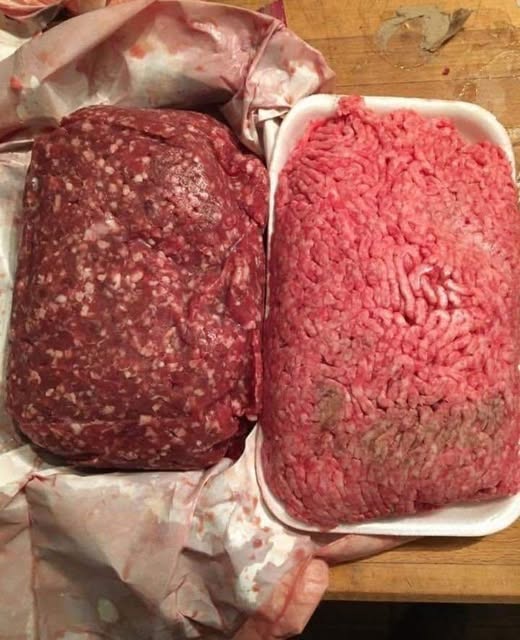Know What You’re Buying: Farm-Raised Beef vs Store-Bought Beef
When it comes to selecting quality meat for your family, not all beef is created equal. The difference between farm-raised beef and store-bought beef goes far beyond price tags and packaging. From color and freshness to nutritional value and ethical sourcing, what you choose to bring into your kitchen has a direct impact on your health, the environment, and animal welfare.
Understanding what separates locally sourced, farm-raised beef from supermarket meat allows you to make informed, empowered decisions at the butcher counter or grocery aisle.
1. Color and Freshness: What You See Isn’t Always What You Get
One of the first things consumers notice is the color of the beef. But appearances can be deceiving.
Store-Bought Beef: Pale but Preserved
- Often appears light pink or bright red due to chemical preservatives such as propyl gallate and carbon monoxide used to maintain color and extend shelf life.
- These additives delay oxidation but don’t indicate actual freshness.
- The beef may have been processed and packaged weeks before it hits store shelves.
Farm-Raised Beef: Naturally Rich and Red
- Deeper red hue is a natural sign of freshness and lack of chemical treatment.
- Often aged for flavor, not artificially preserved.
- Comes from recently harvested animals, typically processed in small batches with transparency in handling.
Verdict: Farm-raised beef wins in freshness and authenticity. No dyes, no tricks—just natural meat color as it should be.
2. Source Transparency: Know Where Your Beef Comes From
In an age where consumers are demanding clarity and honesty, source transparency matters more than ever.
Supermarket Beef: A Global Mystery
- Despite labeling claims like “Product of the USA,” much of the beef in supermarkets is imported from Canada, Brazil, Argentina, and more.
- Cuts can be ground or processed from multiple animals, making it nearly impossible to trace origin or quality.
- Factory farming dominates the supply chain, leading to overcrowded, inhumane conditions, and excessive use of antibiotics and hormones.
Farm-Raised Beef: Local, Ethical, and Traceable
- Usually sourced from one animal per package or small herds, processed at local butcheries or USDA-inspected facilities.
- Raised with pasture access, ethical treatment, and often grass-fed or grass-finished diets.
- You often have the opportunity to know your farmer, ask about feeding practices, and understand the entire lifecycle of the animal.
Verdict: If ethical sourcing and food transparency are important to you, farm-raised beef is the clear choice.
3. Taste and Nutrition: More Than Just a Meal
Your beef should nourish your body and satisfy your taste buds. Farm-raised beef excels in both.
Store-Bought Beef: Standardized and Sterile
- Often grain-fed for rapid weight gain, resulting in higher fat but lower-quality omega-3 content.
- Mass production leads to bland, uniform flavor and reduced nutrient density.
- May include traces of hormones, antibiotics, or other residual contaminants from factory farming.
Farm-Raised Beef: Nutrient-Dense and Flavorful
- Grass-fed beef is richer in:
- Omega-3 fatty acids
- Vitamin E
- Conjugated Linoleic Acid (CLA)
- Antioxidants
- Natural diet and stress-free environments yield more flavorful, juicy, and nutrient-rich meat.
- Lower in saturated fats and higher in heart-healthy fats, making it a better option for those watching cholesterol or overall health.
Verdict: Farm beef delivers superior nutrition and taste, ideal for those who value clean eating and full flavor.
4. Environmental and Ethical Considerations
The decision between farm and store-bought beef also affects the planet and animal welfare.
Store-Bought Beef: Industrial Footprint
- Contributes to deforestation, especially in countries like Brazil where rainforest is cleared for cattle grazing.
- Intensive farming produces significant methane emissions and water waste.
- Animals are often kept in confined animal feeding operations (CAFOs) with minimal care.
Farm-Raised Beef: Regenerative and Responsible
- Smaller farms often practice rotational grazing, which helps rebuild soil health and reduce carbon impact.
- Animals have access to pasture, cleaner water, and are handled humanely.
- More sustainable in terms of land use, waste management, and local food systems.
Verdict: Choosing farm-raised beef supports regenerative agriculture, animal welfare, and environmental stewardship.
5. Price: Paying for Quality and Ethics
Yes, farm-raised beef is typically more expensive, but you’re investing in:
- Higher nutritional value
- Cleaner, safer food
- Animal welfare
- Support for local farmers and economies
Supermarket beef may be cheaper upfront, but the hidden costs—health concerns, ethical compromises, and environmental damage—can be far greater in the long run.
Final Thoughts: Choose Wisely, Eat Consciously
When it comes to feeding your family, knowledge is power. Choosing farm-raised beef means supporting better farming practices, eating nutrient-rich food, and gaining peace of mind knowing where your meat comes from.
✔ Better taste
✔ Cleaner nutrition
✔ Ethical sourcing
✔ Environmental responsibility
The next time you’re at the meat counter or farmers market, ask yourself: “Do I know what I’m buying?”
